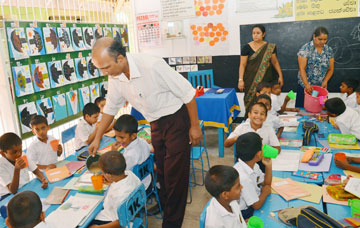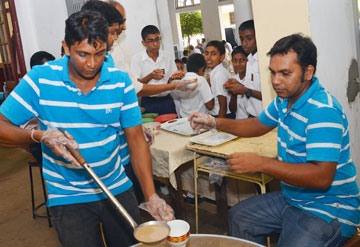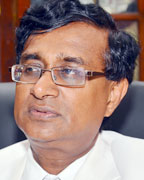Royal porridge goes down well
By Dhaneshi Yatawara
Medical experts in Sri Lanka have pointed out that obesity among
schoolchildren has been on the increase during the past few years and
the Western Province is the most affected. Although obesity was
previously thought to be prevalent in Western countries especially among
the rich and affluent families, the number of obese children in
developing countries is increasing steadily, even among the not so
well-to-do families.
 |
| Students of
the primary division enjoying the porridge |
 |
| At the
porridge counter |
Fast food and soft drinks have become easy tools for children to win
the rat race. The food items contain a plenty of artificial agents like
taste enhancers, emulsifiers, colouring and preservatives and added
sugar and salt, and high fat and carbohydrate contents which make
growing-up children, sick adults.
 |
| Principal
Upali Gunasekara |
 |
| P.A.P.
Damayanthi |
Today any family, even with a marginal income, has a television.
Video games and shows have become popular for children, even from their
tender ages.
Even to feed a toddler parents use the TV and video shows. Watching
too much TV, hours spent playing computer and video games, and sleeping
longer hours contribute to the slow burning of calories and eventual
addition of fat to your body. A recent survey carried out in Sri Lanka
revealed that only 9.2% of the children in the sample were physically
active on most days of a week.
As a solution the health authorities stress the need for habitual
changes in children especially those in the schooling age and a
nutritional-rich healthy diet. Lists of healthy food were sent to the
parents and children to follow while school canteens were strictly
instructed to sell only nutritious food.
In such a background a leading school in the country, Royal College,
introduced traditional food for the students. Today the 'kenda' made at
Royal College has captured the attention of the entire country. At
present over 1,000 cups of 'kenda' is in demand in the college.
"To me, the miracle is that these children who were so attracted to
hamburgers, hotdogs, smoothies and soft drinks replaced them all their
with this cup of porridge," said the principal Upali Gunasekara. If not
for principal Gunasekara's efforts the goodwill project would not have
been a success. Today it has become an essential feature of the children
and the teachers of the school.
"We see a drastic change in the children today. Their enthusiasm to
education and their vibrant approach to everyday activities has been all
positive," he said.
The porridge is not just another 'Kolakenda'. It is an unique
Ayurveda mixture of four types of native rice along with another herbal
mix. "This is entirely a time-tested ayurvedic mixture that had been in
use. We consulted medical experts on the medicinal and nutritional value
before giving it to the children," said teacher-in-charge P.A.P.
Damayanthi. Setting an example principal Gunasekara and Damayanthi
teacher have changed their lifestyles. "I am a member of the 'Hela
Suwaya' Organisation and our members are doing everything to bring in
healthy food to Sri Lankan communities. With the principal's approval I
tried to introduce healthy eating habits among my colleagues and
students," said Damayanthi, a teacher.
The effort made about a year ago has become almost an enterprise
today. Four to five people are working with a sense of dedication along
with Damayanthi teacher who leaves home around 3.30 a.m. "The team
meditates a few minutes before making the porridge and while making it
we all pray that this will bring good health to those who drink it, she
said.
The four types of native rice - kaluheenati, madathawalu, kahawanu
and pachchaperumal had not been within the reach of Sri Lankans for many
years and due to the efforts by the members of 'Hela Suwaya" the
consumption is on the increase. Another mixture is added which includes
garlic, red onions, pepper, rampe, curry leaves, thebu , neeramulliya,
hathavariya, welpenela, Iriweriya, gotukola, Iramusu (a variety of
herbal leaves), leaves of Passion fruit and raddish, 'Sathakuppa', green
gram, chickpeas, mustard, ladies fingers, bees honey and ghee.
All these ingredients are collected by members of the 'Hela Suwaya'
who live a mentally and physically advanced life. Farmers who are
working with the organisation provide all these which according to
Damayanthi are purchased and some are donated. "We bring pepper grown in
Kotmale, leaves such as kowakka and iramusu are brought from
Thissamaharama,' according to Damayanthi.
This porridge has been a life changer.
"It cured gastritis and migraine, I was suffering for 10 years," said
Renuka Widyarathne, another teacher of Royal College. She teaches
Geography and Sinhala to the middle school and her ailments had been a
drawback to her career.
" Though I do exercises every day like going for a brisk walk, I had
difficulties in climbing stairs. As Damayanthi brought in this new
product I tried it simply because it was good for anyone's health.
Within a month and a half I felt a big change.
The gastritis and migraine and the pain in the joints ceased. Most of
our colleagues specially in their middle age found that this over came
many of their health problems," she said.
People and children are willing to practise these healthy habits.
If this change was possible in a Colombo 7 college where burger and
fast food outlets are round the corner and where luxury living is
prominent, there could be no difficulty in introducing them to any part
of the country. |

